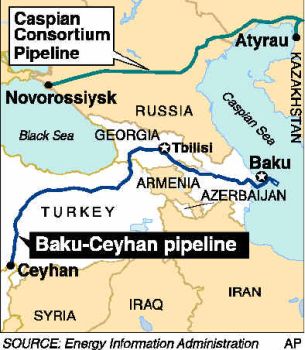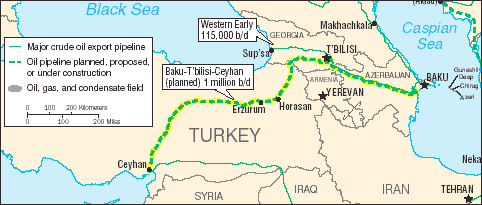Is there a relationship between the bombing of Lebanon and the inauguration of the World's largest strategic pipeline, which will channel more a million barrels of oil a day to Western markets?
Virtually unnoticed, the inauguration of the Ceyhan-Tblisi-Baku (BTC) oil pipeline, which links the Caspian sea to the Eastern Mediterranean, took place on the 13th of July, at the very outset of the Israeli sponsored bombings of Lebanon.

BTC Pipeline Route

BTC Pipeline Route
One day before the Israeli air strikes, the main partners and shareholders of the BTC pipeline project, including several heads of State and oil company executives were in attendance at the port of Ceyhan. They were then rushed off for an inauguration reception in Istanbul, hosted by Turkey's President Ahmet Necdet Sezer in the plush surroundings of the Çýraðan Palace.
Also in attendance was British Petroleum's (BP) CEO, Lord Browne together with senior government officials from Britain, the US and Israel. BP leads the BTC pipeline consortium. Other major Western shareholders include Chevron, Conoco-Phillips, France's Total and Italy's ENI. (see Annex)
Israel's Minister of Energy and Infrastructure Binyamin Ben-Eliezer was present at the venue together with a delegation of top Israeli oil officials.
The BTC pipeline totally bypasses the territory of the Russian Federation. It transits through the former Soviet republics of Azerbaijan and Georgia, both of which have become US "protectorates", firmly integrated into a military alliance with the US and NATO. Moreover, both Azerbaijan and Georgia have longstanding military cooperation agreements with Israel. In 2005, Georgian companies received some $24 million in military contracts funded out of U.S. military assistance to Israel under the so-called "Foreign Military Financing (FMF) program". http://www.jewishvirtuallibrary.org/jsource/states/GA.html
Israel has a stake in the Azeri oil fields, from which it imports some twenty percent of its oil. The opening of the pipeline will substantially enhance Israeli oil imports from the Caspian sea basin. But there is another dimension which directly relates to the war on Lebanon. Whereas Russia has been weakened, Israel is slated to play a major strategic role in "protecting" the Eastern Mediterranean transport and pipeline corridors out of Ceyhan.
Militarization of the Eastern Mediterranean
The bombing of Lebanon is part of a carefully planned and coordinated military road map. The extension of the war into Syria and Iran has already been contemplated by US and Israeli military planners. This broader military agenda is intimately related to strategic oil and oil pipelines. It is supported by the Western oil giants which control the pipeline corridors. It ultimately seeks territorial control over the East Mediterranean coastline.
In this context, the BTC pipeline dominated by British Petroleum, has dramatically changed the geopolitics of the Eastern Mediterranean, which is now linked , through an energy corridor, to the Caspian sea basin:
"[The BTC pipeline] considerably changes the status of the region's countries and cements a new pro-West alliance. Having taken the pipeline to the Mediterranean, Washington has practically set up a new bloc with Azerbaijan, Georgia, Turkey and Israel, " (Komerzant, Moscow, 14 July 2006)
Israel is now part of the Anglo-American military axis, which serves the interests of the Western oil giants in the Middle East and Central Asia.
While the official reports state that the BTC pipeline will "channel oil to Western markets", what is rarely acknowledged is that part of the oil from the Caspian sea would be directly channeled towards Israel. In this regard, an underwater Israeli-Turkish pipeline project has been envisaged which would link Ceyhan to the Israeli port of Ashkelon and from there through Israel's main pipeline system, to the Red Sea.
The objective of Israel is not only to acquire Caspian sea oil for its own consumption needs but also to play a key role in re-exporting Caspian sea oil back to the Asian markets through the Red Sea port of Eilat. The strategic implications of this re-routing of Caspian sea oil are farreaching.
In April 2006, Israel and Turkey announced plans for four underwater pipelines, which would bypass Syrian and Lebanese territory.
"Turkey and Israel are negotiating the construction of a multi-million-dollar energy and water project that will transport water, electricity, natural gas and oil by pipelines to Israel, with the oil to be sent onward from Israel to the Far East"
"The new Turkish-Israeli proposal under discussion would see the transfer of water, electricity, natural gas and oil to Israel via four underwater pipelines."
http://www.jpost.com/servlet/Satellite?cid=1145961328841&pagename=JPost%2FJPArticle%2FPrinter
"Baku oil can be transported to Ashkelon via this new pipeline and to India and the Far East.[via the Red sea]"
"Ceyhan and the Mediterranean port of Ashkelon are situated only 400 km apart. Oil can be transported to the city in tankers or via specially constructed under-water pipeline. From Ashkelon the oil can be pumped through already existing pipeline to the port of Eilat at the Red Sea; and from there it can be transported to India and other Asian countries in tankers."
Water for Israel
Also involved in this project is a pipeline to bring water to Israel, pumping water from upstream resources of the Tigris and Euphrates river system in Anatolia. This has been a long-run strategic objective of Israel to the detriment of Syria and Iraq. Israel's agenda with regard to water is supported by the military cooperation agreement between Tel Aviv and Ankara.
The Re-routing of Central Asian Oil
Diverting Central Asian oil and gas to the Eastern Mediterranean (under Israeli military protection), for re-export to Asia, serves to undermine the inter-Asian energy market, which is based on the development of direct pipeline corridors linking Central Asia and Russia to South Asia, China and the Far East.
Ultimately, this design is intended to weaken Russia's role in Central Asia and cut off China from Central Asian oil resources. It is also intended to isolate Iran.
Meanwhile, Israel has emerged as a new powerful player in the global energy market.
War and Oil Pipelines
Prior to the bombing of Lebanon, Israel and Turkey had announced the underwater pipeline routes, which bypassed Syria and Lebanon. These underwater pipeline routes did not overtly encroach on the territorial sovereignty of Lebanon and Syria.
On the other hand, the development of alternative land based corridors (for oil and water) through Lebanon and Syria would require Israeli-Turkish territorial control over the Eastern Mediterranean coastline through Lebanon and Syria.
The implementation of this project requires the militarisation of the East Mediterranean coastline, sea ways and land routes, extending from the port of Ceyhan across Syria and Lebanon to the Lebanese-Israeli border.
Is this not one of the hidden objectives of the war on Lebanon? Open up a space which enables Israel to control a vast territory extending from the Lebanese border through Syria to Turkey.
"The Long War"
Israeli Prime minister Ehud Olmert has stated that the Israeli offensive against Lebanon would "last a very long time". Meanwhile, the US has speeded up weapons shipments to Israel.
There are strategic objectives underlying the "Long War" which are tied to oil and oil pipelines.
The air campaign against Lebanon is inextricably related to US-Israeli strategic objectives in the broader Middle East including Syria and Iran. In recent developments, Secretary of State Condoleeza Rice stated that the main purpose of her mission to the Middle East was not to push for a ceasefire in Lebanon, but rather to isolate Syria and Iran. (Daily Telegraph, 22 July 2006)
At this particular juncture, the replenishing of Israeli stockpiles of US produced WMDs points to an escalation of the war both within and beyond the borders of Lebanon.
Annex
The BTC Co. shareholders are: BP (30.1%); AzBTC (25.00%); Chevron (8.90%); Statoil (8.71%); TPAO (6.53%); Eni (5.00%); Total (5.00%), Itochu (3.40%); INPEX (2.50%), ConocoPhillips (2.50%) and Amerada Hess (2.36%). (source BP)
For details on th Campaign against the pipeline see www.bakuceyhan.org.uk
See related articles:
- The Militarisation of the Eastern Mediterranean: Israel's Stake in the Baku-Tbilisi-Ceyhan pipeline - by Michel Chossudovsky
- Planned US-Israeli Attack on Iran, by Michel Chossudovsky
- Is Israel running out of Bombs? New Deliveries of WMD "Made in America" The Replenishing of Israeli WMD stockpiles points to escalation both within and beyond the borders of Lebanon, by Michel Chossudovsky
The final film in Sheffield Indymedia's "Summer of Truth" film festival is War and Globalization - The Truth Behind September 11, a lecture by Michel Chossudovsky.

 Homepage:
Homepage:

Comments
Hide the following 2 comments
A Planet On The Edge Of Anarchy?
01.08.2006 08:55
In a recent article, Michael Chossudovsky asks an interesting question:
He continues:
He then quotes a Jerusalem Post article:
So Israel appears to be securing its own personal supply of oil and water, with the water also being transported undersea. What has changed that Israel now needs its own private oil and water supply? A few years ago everyone was saying that the US invasion of Iraq was "for the oil", which allows us to suggest that 9/11, which provided the justification for the Iraq invasion, was also "for the oil". But with the US government's claims that the Iraq invasion was about WMDs, and when that fell flat, it was about spreading democracy, and when that became somewhat laughable we were brought back to the "war on terror", there picture has been sufficiently muddied that talk of exactly why the US invaded Iraq has been silenced.
We can say with some confidence that in the world of international politics and warmongering, nothing is ever as it seems. And while Israel adn the US might claim that they are just planning for the future and securing their energy and water needs, the nature of these two governments as evidenced by thier current and track records, tends to make us skeptical that their intentions are as wholesome as they claim.
Along with "securing water and oil resources", Israel is currently creating a "buffer zone" in southern Lebanon. Israel claims this is to protect against Hizb'allah's rockets, yet, as the entire world is saying, Israel's actions are massively disproportionate to the threat. So what might be the real agenda here?
It seems to me that these events and the events of the past 5 years are best viewed in light of the infamous Pentagon Report on Climate Change from 2004, where it was stated:
Maybe the "war on terror" was never really about terrorism. Maybe that that was just the excuse. Maybe the global elite have known for a long time about natural earth-shattering (literally?) events in the very near future, and they simply created a "war on terror" behind which they could forcibly re-shape the political and demographic landscape of the Middle East in order to ensure their own survival during the upcoming "global anarchy", as the Pentagon report puts it.
Food for thought, if nothing else.
Joe Quinn (reposted)
 Homepage:
http://signs-of-the-times.org/signs/editorials/signs20060728_APlanetOnTheEdgeOfAnarchy.php
Homepage:
http://signs-of-the-times.org/signs/editorials/signs20060728_APlanetOnTheEdgeOfAnarchy.php
Pipeline Time
02.08.2006 22:04
Pipeline Politics and Oil Imperium from Azerbaijan, to Ashkelon and Mogadishu
gnn